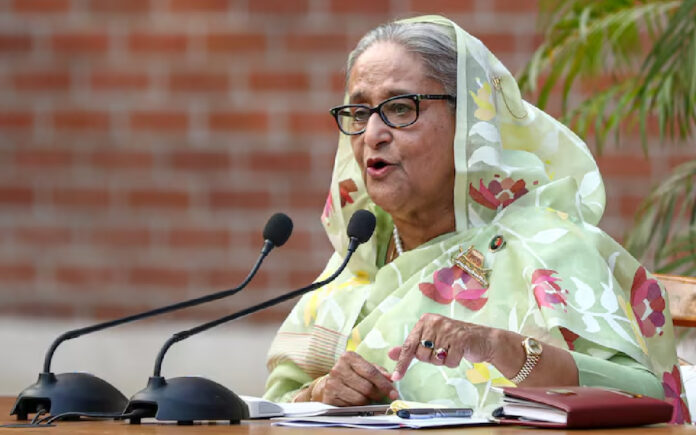Dhaka: Bangladesh has formally requested India to prevent ousted former Prime Minister Sheikh Hasina from making “false and fabricated” remarks during her stay in the country, the Bangladeshi foreign ministry announced.
Hasina fled to India last year following violent protests that resulted in over 1,000 fatalities. In an online address on Wednesday, she urged her supporters to resist Bangladesh’s interim government, accusing it of unlawfully seizing power.
Ahead of her speech, thousands of protesters gathered in Dhaka. In an apparent effort to disrupt her address, demonstrators attacked the residence of Mujibur Rahman, Hasina’s father and Bangladesh’s founding leader, setting it on fire. The unrest persisted after her speech.
In response, Bangladesh’s foreign ministry summoned India’s acting high commissioner in Dhaka and handed over a formal protest note. The ministry expressed “deep concern, disappointment, and serious reservations” over Hasina’s statements, according to an official statement posted on its Facebook page.
“The ministry … requested … India to immediately take appropriate measures, in the spirit of mutual respect and understanding, to stop her from making such false, fabricated, and incendiary statements … while she is in India,” the statement read.
Efforts to reach Hasina for comment were unsuccessful.
While India has not officially responded to Bangladesh’s diplomatic note, Foreign Ministry Spokesperson Randhir Jaiswal condemned the attack on Rahman’s residence, labeling it an “act of vandalism.”
“It is regrettable … All those who value the freedom struggle that nurtured Bangla identity and pride are aware of the importance of this residence for the national consciousness of Bangladesh,” he said.
Rahman declared Bangladesh’s independence from Pakistan in 1971 from this very house. In 1975, he and most of his family members were assassinated within its walls. Hasina later converted the building into a museum honoring her father’s legacy.
Also Read | First Rate Cut in 5 Years: RBI Adopts Neutral Stance on Monetary Policy
The press office of Muhammad Yunus, the chief adviser to Bangladesh’s interim government, stated on Thursday that the attack on Rahman’s residence was a direct reaction to Hasina’s “violent behavior.”
“The government hopes that India will not allow its territory to be used for destabilizing purposes in Bangladesh and will not allow Sheikh Hasina to speak,” the statement read.
Also Read | Cold Weather, Wildfires Weigh on U.S. Job Growth in January
Since Hasina’s departure to India in August, Bangladesh has been embroiled in political turmoil. The interim government continues to struggle with maintaining law and order amid widespread protests and unrest.
India and Bangladesh share a 4,000-kilometer (2,500-mile) border and maritime boundaries in the Bay of Bengal. The two nations have deep-rooted cultural and economic ties, with India playing a crucial role in Bangladesh’s 1971 war of independence against Pakistan.



